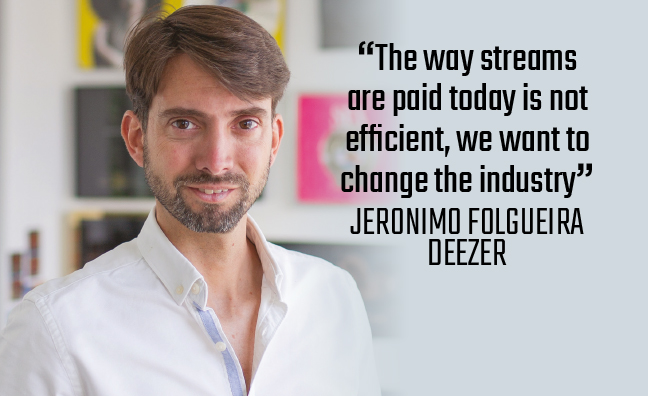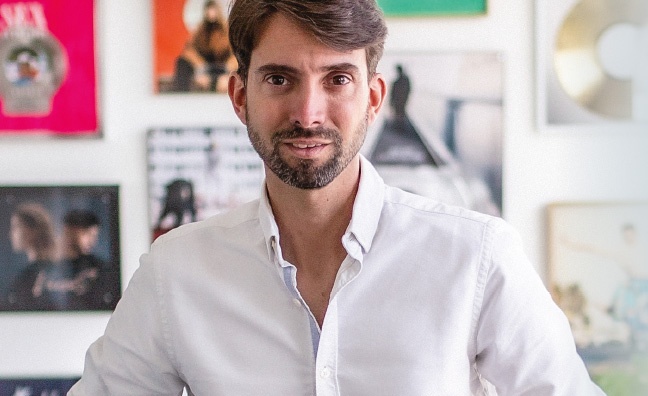Deezer CEO Jeronimo Folgueira is coming up to his second anniversary at the Paris-based global streaming service.
In the latest edition of Music Week, the Spanish music executive gives an outspoken interview about the music industry and the streaming market, including some spiky comments on his rivals ("Spotify want to be all things audio... we have music at our heart").
Deezer is a giant in the French music market and it has a truly global reach, but Folgueira is now focusing on building its presence in key markets such as Brazil, Germany and the UK (including the acquisition of a stake in livestreaming company Driift). Deezer will issue its latest results at the end of the month.
Folgueira, the former CEO at German dating app Spark Networks, has made some bold moves since entering the music industry, including taking Deezer public, building b2b partnerships and increasing prices (that was back in 2021 - others are now catching up). A price hike may not be popular during a recession but the early decision by Deezer has paid off in terms of a boost in average revenue per user (ARPU), which Spotify is still struggling to increase in a meaningful way.
Growing ARPU is one of the key themes of the Deezer strategy from the music industry outsider, who’s aiming to make Deezer a major player. Here, Jeronimo Folgueira shares five big ideas for the future of streaming…
More creativity, fewer lawyers
“I never sold music [prior to Deezer], but I have always sold emotions and experiences. So I sold love, I sold excitement. But this is something that we’re missing. We're not really selling emotion, we're selling access to a catalogue, and that's where I think the mindset has to fundamentally change. It all starts with the artists and the music, we cannot forget that that is the source of our industry - the artists that make music. The people that consume it - the fans - go there for that piece of art. But then in between, on our side, for example, you have a lot of tech guys, and then on the label side you have a lot of lawyers. That is where we're killing the creativity along the way in the industry. I think this is an industry where there are just probably way too many lawyers in between, getting in the way of art and innovation. We need to think differently.
“By coming from outside of the music industry, it really helped me challenge everything. When I started, a lot of people were still talking about piracy. But the world has changed, the world has moved on, and at some point you have to let go and embrace the future instead of keep looking at the past. In the music industry in particular, most of the people stay there for a very long time and it’s a closed environment. There are not enough cool, creative ideas coming from the outside, and I think that's needed. You need a few more people that come from the outside to shake things up and think in a completely different way, especially about business models.”
Prioritise breaking artists over catalogue
“People love listening to music from their life and past. That catalogue will always be there and will always be valuable. Sometimes it’s just really classic [music], even the new [audiences] will come and discover those old classics that are simply awesome. So the catalogue has a big part to play. It will always be there, it is what people want and will continue to consume.
“And then you have new music and discovery of new music, and that's where I think that the DSPs can do a better job - helping people discovering new music and helping up-and-coming artists break through. It is now much harder to break through as an artist than ever before. A lot of the consumption is driven by algorithms and recommendations, and there are fewer promotion capabilities, media consumption has gone down. So even if you get an interview on the TV, you get less of an audience and actually the younger audiences are already long gone - and those are the ones that discover new music. Then on social media, you need to build your following first. So it's getting harder and harder to break through. That's where DSPs like Deezer can actually play a role to help people discover music even more than we do today. That's something that I would really like Deezer to be more active with - discovery of new music.”
Rethinking growth strategy
“The [market] penetration can still go higher, we haven't reached the limits, neither in the UK nor in the US for consumption. But it's true that the growth will slow down naturally. So now that we’ve got to that level of penetration and that level of consumption, it's not really about growing subscribers, it's more about growing ARPU [average revenue per user]. I think the growth can be massive, but it will probably be driven more by ARPU than by subscribers. That's where I think everyone needs to change the mindset, because basically ARPU has been flat or actually going down because of the family [subscription plan] effect and so on for years and years. Everyone focused on penetration and subscribers.
“I think in these more mature markets, we need to all change the mindset and it's more about focusing on ARPU and monetisation. The moment we do that, then these markets will have so much potential - we can still double or triple the UK or the US in terms of [revenue]. There is a massive opportunity. We just need to approach it differently and have a different strategy. Deezer has changed prices already in the UK, but the fact that no one actually touched prices for more than 10 years, it’s really unthinkable in pretty much any industry. So that's where a big chunk of the growth should come from.”

Reforming royalty payments
“We continue to be supportive of user-centric [Deezer was an early adopter in exploring the model] and we want to be fair and pay artists fairly. Ultimately, as you know, we don't pay artists; we pay the labels and the labels pay the artists. So effectively what we need to do is agree with the labels on the payment system, and that's why it has been very difficult because you need to agree with all the different labels. All of them have different agendas and strategies. Because of the way the industry works, if you change the payment system, there will always be winners and there will always be losers. It's a zero-sum game, so someone will win and someone will lose. And that's why it has been so difficult to implement it.
“We haven't given up on user-centric. We're trying to find a way of implementing it and we're trying to find a way of making it better and fairer, so that it actually benefits the right people and gets the support from all the labels, especially the majors, to move forward. We will keep pushing for a change in the remuneration of artists - the way streams are paid for today [the pro-rata model where it’s divided up among rights-holders] is not efficient. It was a simple and quick way of doing it in the very early days. But now with the data and the technology we have, there are many ways where you can pay in a far more fair and efficient way. And that's something that we will keep working on. We want to change the industry and make it really happen. That takes a lot of time, it's not an easy industry to change, especially when there are winners and losers. But I really believe that we will find a way of changing the remuneration system eventually, ideally sooner rather than later. And we will be at the forefront of that change.”
Evolving audio streaming
“When you think about music, music is not just audio - music is video, music is experiences, going to a concert. Music is so much richer than just the audio files themselves, and that's where we see our product evolving. Also, music is very social, [but] the way we consume music today through the DSPs is very machine-to-person, it’s not that social. Yes, you have some collaborative playlists and you share stuff. But it's not as social as music should be, because music was invented by humans to connect. Music is what brings us together and it's a very social thing, by definition, and we’re missing that element. So we're looking into how to bring video experiences, how to bring offline experiences, how to bring social experiences, and that's exactly the direction our product is going to be taking.”
Music Week subscribers can read the interview with Jeronimo Folgueira here.









